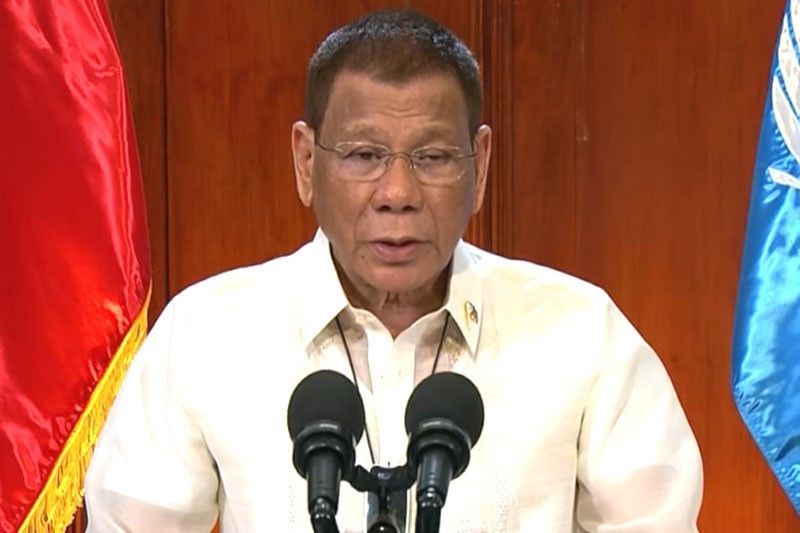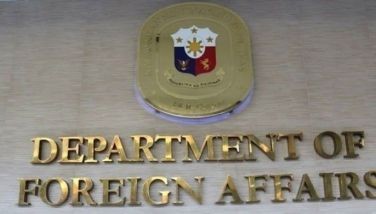In UN speech, Duterte accuses critics of ‘weaponizing’ human rights

MANILA, Philippines (Updated 11:49 a.m.) — In his maiden speech before the United Nations General Assembly, President Rodrigo Duterte defended his internationally-condemned campaign against illegal drugs and accused critics of weaponizing the issue of human rights.
The chief executive said in a pre-recorded speech that the government will continue to protect the human rights of Filipinos, especially from the scourge of illegal drugs, criminality and terrorism.
But the Duterte administration, elected on a campaign promise of a ruthless anti-narcotics and anti-crime platform, has been widely criticized for its brutal “war on drugs” that has killed thousands and its vilification of dissent and attacks against perceived critics.
“A number of interest groups have weaponized human rights; some well-weaning, others ill-intentioned. They attempt to discredit the functioning institutions and mechanisms of a democratic country and a popularly elected government which in its last two years, still enjoy the same widespread approval and support,” Duterte told the assembly.
He then accused his critics of pretending to be human rights advocates “while preying on the most vulnerable humans” and spreading “malevolence and anti-government” propaganda even in schools.
“They hide their misdeeds under the blanket of human rights but the blood oozes through,” the president said.
A report of the United Nations Office of the High Commissioner on Human Rights found that the government’s “heavy-handed” focus on combating illegal drugs and security threats—coupled with incitement to violence from top officials—has resulted in grave human rights violations, including “widespread and systematic” extrajudicial killings.
The UN report also said that human rights advocacy and activism in the Philippines are routinely equated with insurgency. It added that vilification of dissent and attacks against perceived government critics are being “increasingly institutionalized and normalized in ways that will be very difficult to reverse.”
The Commission on Human Rights, in a report released in July, said the legitimization of violence against rights defenders in the Philippines was made possible by Duterte.
During the opening session of the Human Rights Council in Geneva last week, UN rights chief Michelle Bachelet called on the Duterte government to revoke policies and rhetoric that lead to killings and other human rights abuses.
‘Open dialogue’ but…
Speaking to the UN General Assembly, Duterte also called for “open dialogue and constructive engagement” with the United Nations on human rights issues, but only if there is “non-interference.”
“These must be done in full respect to the principles of objectivity, non-interference, non-selectivity and genuine dialogue. These are the fundamental bases for productive international cooperation on human rights,” he said.
Duterte and his men often lash out at what they deemed as meddling in Philippines’ domestic affairs when countries and international organizations express concerns on the president’s policies and statements.
Bachelet earlier said that her team was not granted access to the Philippines but that the government cooperated with the review of her office through written submissions and meetings outside the country.
Several times in his presidency, Duterte has criticized and insulted UN officials. In 2016, he called former UN rights chief Zeid Ra’ad Al Huseein “idiot” and in 2018, called him “empty-headed.”
The president also threatened to slap Agnes Callamard, UN special rapporteur on extrajudicial killings, if she starts her probe into the killings and abuses in the drug war.
Vilification of rights defenders
Rights group Karapatan slammed Duterte for his “glaring efforts” to vilify human rights defenders and to undermine their calls for accountability.
“Duterte is now blatantly lying through his teeth in making desperate please before the international community that is growing increasingly critical of his human rights abuses and tyrannical rule,” Cristina Palabay, Karapatan secretary general, said in a statement Wednesday.
Palabay also called his proposal for an open dialogue with the UN “farce.”
“If he was truly for an open dialogue and constructive engagement with the UN, then he would’ve allowed UN Special Rapporteurs and human rights experts to freely conduct an investigation on the sham drug war and his other human rights abuses—but instead, they are met with threats of violence, wild accusations of foreign meddling, and demeaning insults. They even rejected the findings of the recent UN Human Rights Council report,” she said.
Human rights organizations are hoping that the UN Human Rights Council will act on the situation in the Philippines, noting that failure to do so means more people will die and a climate of impunity will continue to persist.
The UN rights council began its session last week. It will last until October 6.
Related video:
- Latest
- Trending

































